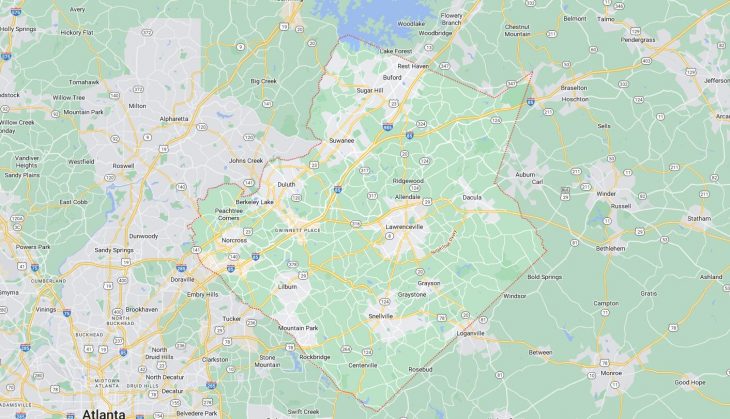Cities and Towns in Gwinnett County, Georgia
Founded in 1818, Gwinnett County is one of 159 counties in the state of Georgia. Historically, Gwinnett County was formed from Cherokee Cession of 1817 and Creek Cession of 1818. The city of Lawrenceville is the county seat. With FIPS code of 135, Gwinnett County has a population of 964,546 and area of 433 square miles (1,121 km²).
List of all cities in Gwinnett County, GA alphabetically
| City/Town | Postal Code | Area Code |
| Berkeley Lake, GA | 30092 | 770/678/470 |
| 30096 | 770/678/470 | |
| Buford, GA | 30515 | 770/678/470 |
| 30518 | 770/678/470 | |
| 30519 | 770/678/470 | |
| Centerville Branch, GA | 30039 | 770/678/470 |
| Dacula, GA | 30019 | 770/678/470 |
| Duluth, GA | 30026 | 770/678/470 |
| 30029 | 770/678/470 | |
| 30095 | 770/678/470 | |
| 30096 | 770/678/470 | |
| 30098 | 770/678/470 | |
| 30099 | 770/678/470 | |
| Grayson, GA | 30017 | 770/678/470 |
| Johns Creek, GA | 30024 | 770/678/470 |
| Lawrenceville, GA | 30042 | 770/678/470 |
| 30043 | 770/678/470 | |
| 30044 | 770/678/470 | |
| 30045 | 770/678/470 | |
| 30046 | 770/678/470 | |
| 30049 | 770/678/470 | |
| Lilburn, GA | 30047 | 770/678/470 |
| 30048 | 770/678/470 | |
| Norcross, GA | 30003 | 770/678/470 |
| 30010 | 770/678/470 | |
| 30071 | 770/678/470 | |
| 30091 | 770/678/470 | |
| 30092 | 770/678/470 | |
| 30093 | 770/678/470 | |
| North Metro, GA | 30026 | 770/678/470 |
| 30029 | 770/678/470 | |
| Parkway, GA | 30092 | 770/678/470 |
| Peachtree Corners, GA | 30092 | 770/678/470 |
| Primerica Financial Services, GA | 30099 | 770/678/470 |
| Rockbridge, GA | 30093 | 770/678/470 |
| Snellville, GA | 30039 | 770/678/470 |
| 30078 | 770/678/470 | |
| State Farm Insurance Co, GA | 30098 | 770/678/470 |
| Sugar Hill, GA | 30518 | 770/678/470 |
| Sugarhill, GA | 30518 | 770/678/470 |
| Suwanee, GA | 30024 | 770/678/470 |














































